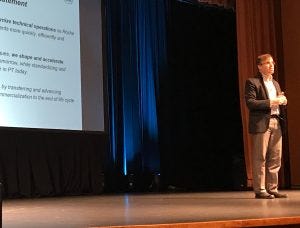Genentech says it is looking to disruptive technologies for a fast and agile response to capacity demands as its portfolio evolves away from large volume biologics.
At BPI West in Santa Clara last week, Eric Fallon, senior director of Pharma Technical Innovation of Technology & MSAT at Genentech, spoke about the difficulties in driving performance and carrying out tech transfers within its large global manufacturing network.
“Our manufacturing infrastructure is built around large, economies of scale, facilities. They can be adjusted but getting into small volumes is all a bit new to us,” he said. “We have six manufacturing sites which all came from different parents, so to speak.”

The future will see volumes decrease. Image: iStock/bogdandreava
The South San Francisco facility and Vacaville, California drug substance sites were both built up by Genentech. The firm, meanwhile, acquired the Oceanside, California plant with 90,000 L of bioreactor capacity from Biogen Idec in 2005. And in Europe Genentech’s network merges into parent company Roche’s through the Basel, Switzerland and Penzberg, Germany drug substance plants. In Singapore, Genentech paid CDMO Lonza $290 million for an 80,000 L mammalian plant in 2009.
In total, Genentech/Roche’s network has 985,000 L of bioreactor capacity, according to BioPlan Associates’ Top 1000 Biopharmaceutical Facilities Index. The majority of this is of course stainless steel, but Fallon said his firm must – like much of the industry – look to innovation, standardization and single-use technologies to manage its future operations.
Lower volumes
The firm has spent the last 30 years focused on large-scale biologics and produces some of the world’s top selling drugs in huge volumes.

Genentech’s Eric Fallon was speaking at BPI West in Santa Clara, CA last week
But since 2013, R&D innovation at Genentech has led to 28 US FDA breakthrough therapy designations aimed mostly at diseases targeting reduced patient populations, helping to reshape Genentech’s portfolio based on volumes.
“We are seeing an increase in the number of small volume products and adjusting our capability,” said Fallon.
Genentech has two commercial large volume (more than 2,000 kg per annum) products – Herceptin (trastuzumab) and Rituxan (rituximab) – with three more in the pipeline. As for ‘standard volumes’ between 300 kg and 2,000 kg, the firm makes six commercially and has a further three in later-stage trials. Small volumes of less than 300 kg per year currently represent four of Genentech’s commercial products, but there are a further nine in the pipeline.
Therefore, Fallon said, the firm’s overall intent is to “develop and deploy disruptive technology for fast and agile response to capacity demands with minimal changeover, transfer, staff and regulatory observations,” coupled with the intent to decrease operational and capital expenditure.

schedl_b_and_w.jpg?width=100&auto=webp&quality=80&disable=upscale)



schedl_b_and_w.jpg?width=400&auto=webp&quality=80&disable=upscale)


